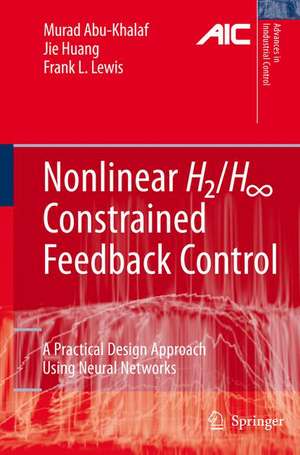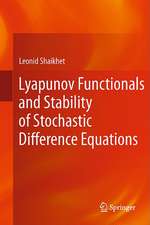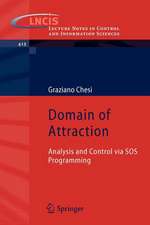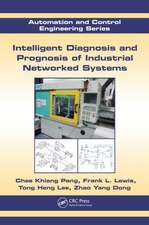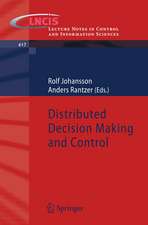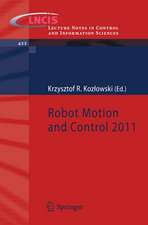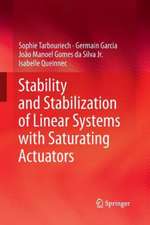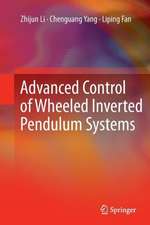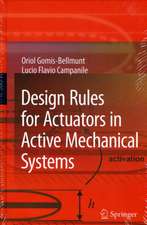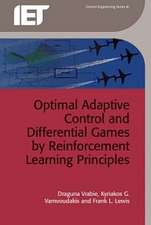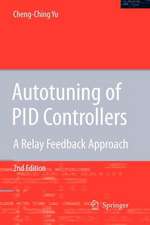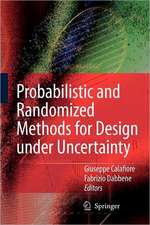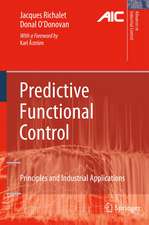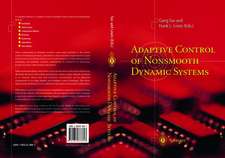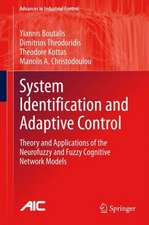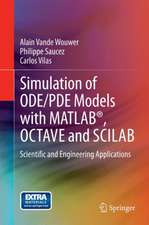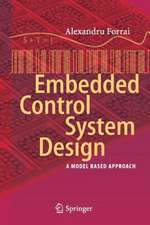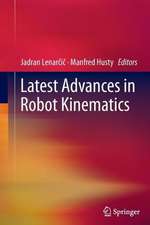Nonlinear H2/H-Infinity Constrained Feedback Control: A Practical Design Approach Using Neural Networks: Advances in Industrial Control
Autor Murad Abu-Khalaf, Jie Huang, Frank L. Lewisen Limba Engleză Hardback – 13 iun 2006
| Toate formatele și edițiile | Preț | Express |
|---|---|---|
| Paperback (1) | 886.75 lei 6-8 săpt. | |
| SPRINGER LONDON – 21 oct 2010 | 886.75 lei 6-8 săpt. | |
| Hardback (1) | 1110.72 lei 6-8 săpt. | |
| SPRINGER LONDON – 13 iun 2006 | 1110.72 lei 6-8 săpt. |
Din seria Advances in Industrial Control
- 15%
 Preț: 643.34 lei
Preț: 643.34 lei - 23%
 Preț: 582.63 lei
Preț: 582.63 lei - 18%
 Preț: 783.98 lei
Preț: 783.98 lei - 18%
 Preț: 947.35 lei
Preț: 947.35 lei - 20%
 Preț: 568.24 lei
Preț: 568.24 lei - 15%
 Preț: 643.16 lei
Preț: 643.16 lei - 18%
 Preț: 899.21 lei
Preț: 899.21 lei - 18%
 Preț: 891.33 lei
Preț: 891.33 lei - 18%
 Preț: 740.57 lei
Preț: 740.57 lei - 18%
 Preț: 961.23 lei
Preț: 961.23 lei - 18%
 Preț: 955.08 lei
Preț: 955.08 lei - 15%
 Preț: 645.28 lei
Preț: 645.28 lei - 15%
 Preț: 638.43 lei
Preț: 638.43 lei - 18%
 Preț: 901.11 lei
Preț: 901.11 lei - 18%
 Preț: 1410.94 lei
Preț: 1410.94 lei - 18%
 Preț: 728.91 lei
Preț: 728.91 lei - 20%
 Preț: 1003.77 lei
Preț: 1003.77 lei - 18%
 Preț: 947.35 lei
Preț: 947.35 lei - 15%
 Preț: 643.34 lei
Preț: 643.34 lei - 15%
 Preț: 654.30 lei
Preț: 654.30 lei - 18%
 Preț: 950.52 lei
Preț: 950.52 lei - 15%
 Preț: 644.30 lei
Preț: 644.30 lei - 18%
 Preț: 1393.09 lei
Preț: 1393.09 lei - 18%
 Preț: 950.21 lei
Preț: 950.21 lei - 18%
 Preț: 949.90 lei
Preț: 949.90 lei - 18%
 Preț: 949.42 lei
Preț: 949.42 lei - 18%
 Preț: 950.52 lei
Preț: 950.52 lei - 18%
 Preț: 1113.71 lei
Preț: 1113.71 lei - 15%
 Preț: 650.04 lei
Preț: 650.04 lei - 15%
 Preț: 644.95 lei
Preț: 644.95 lei - 18%
 Preț: 950.33 lei
Preț: 950.33 lei - 18%
 Preț: 948.61 lei
Preț: 948.61 lei - 18%
 Preț: 1112.60 lei
Preț: 1112.60 lei - 15%
 Preț: 644.63 lei
Preț: 644.63 lei - 18%
 Preț: 953.20 lei
Preț: 953.20 lei - 18%
 Preț: 945.62 lei
Preț: 945.62 lei - 15%
 Preț: 640.88 lei
Preț: 640.88 lei - 15%
 Preț: 640.88 lei
Preț: 640.88 lei - 20%
 Preț: 650.92 lei
Preț: 650.92 lei - 18%
 Preț: 1112.60 lei
Preț: 1112.60 lei - 20%
 Preț: 998.36 lei
Preț: 998.36 lei - 15%
 Preț: 643.34 lei
Preț: 643.34 lei - 18%
 Preț: 948.92 lei
Preț: 948.92 lei - 18%
 Preț: 1381.43 lei
Preț: 1381.43 lei - 15%
 Preț: 651.51 lei
Preț: 651.51 lei - 15%
 Preț: 647.08 lei
Preț: 647.08 lei - 20%
 Preț: 563.66 lei
Preț: 563.66 lei - 18%
 Preț: 992.64 lei
Preț: 992.64 lei - 18%
 Preț: 1225.79 lei
Preț: 1225.79 lei
Preț: 1110.72 lei
Preț vechi: 1354.54 lei
-18% Nou
Puncte Express: 1666
Preț estimativ în valută:
212.53€ • 222.50$ • 175.86£
212.53€ • 222.50$ • 175.86£
Carte tipărită la comandă
Livrare economică 05-19 aprilie
Preluare comenzi: 021 569.72.76
Specificații
ISBN-13: 9781846283499
ISBN-10: 1846283493
Pagini: 228
Ilustrații: XX, 204 p.
Dimensiuni: 155 x 235 x 17 mm
Greutate: 0.5 kg
Ediția:2006
Editura: SPRINGER LONDON
Colecția Springer
Seria Advances in Industrial Control
Locul publicării:London, United Kingdom
ISBN-10: 1846283493
Pagini: 228
Ilustrații: XX, 204 p.
Dimensiuni: 155 x 235 x 17 mm
Greutate: 0.5 kg
Ediția:2006
Editura: SPRINGER LONDON
Colecția Springer
Seria Advances in Industrial Control
Locul publicării:London, United Kingdom
Public țintă
ResearchCuprins
Preliminaries and Introduction.- Policy Iterations and Nonlinear H 2 Constrained State Feedback Control.- Nearly H 2 Optimal Neural Network Control for Constrained-Input Systems.- Policy Iterations and Nonlinear H ? Constrained State Feedback Control.- Nearly H ? Optimal Neural Network Control for Constrained-Input Systems.- Taylor Series Approach to Solving HJI Equation.- An Algorithm to Solve Discrete HJI Equations Arising from Discrete Nonlinear H ? Control Problems.- H ? Static Output Feedback.
Recenzii
From the reviews:
"This book examines some fundamental modern control problems of nonlinear systems … . The book is very well written. … The results included in the book, along with an extensive bibliography will prove to be an important resource for researchers in this area as well as researchers interested in entering this area. … a good text for a graduate or advanced undergraduate course. Short courses or training courses for control engineers to gain knowledge in nonlinear control systems would be another avenue for this book." (Sanqing Hu and Derong Liu, IEEE Transactions on Automatic Control, Vol. 53 (1), 2008)
"This book examines some fundamental modern control problems of nonlinear systems … . The book is very well written. … The results included in the book, along with an extensive bibliography will prove to be an important resource for researchers in this area as well as researchers interested in entering this area. … a good text for a graduate or advanced undergraduate course. Short courses or training courses for control engineers to gain knowledge in nonlinear control systems would be another avenue for this book." (Sanqing Hu and Derong Liu, IEEE Transactions on Automatic Control, Vol. 53 (1), 2008)
Notă biografică
Frank Lewis is a Professor of Electrical Engineering at The University of Texas at Arlington, where he was awarded the Moncrief-O'Donnell Endowed Chair in 1990 at the Automation and Robotics Research Institute. He is a Fellow of the IEEE, a member of the New York Academy of Sciences, and a registered Professional Engineer in the State of Texas. He is a Charter Member (2004) of the UTA Academy of Distinguished Scholars. He has served as Visiting Professor at Democritus University in Greece, Hong Kong University of Science and Technology, Chinese University of Hong Kong, National University of Singapore. He is an elected Guest Consulting Professor at both Shanghai Jiao Tong University and South China University of Technology.
Dr. Lewis’s current interests include intelligent control, neural and fuzzy systems, microelectromechanical systems (MEMS), wireless sensor networks, nonlinear systems, robotics, condition-based maintenance, and manufacturing process control. He is the author/co-author of 3 U.S. patents, 157 journal papers, 23 chapters and encyclopedia articles, 239 refereed conference papers, nine books, including Optimal Control, Optimal Estimation, Applied Optimal Control and Estimation, Aircraft Control and Simulation, Control of Robot Manipulators, Neural Network Control, High-Level Feedback Control with Neural Networks and the IEEE reprint volume Robot Control. He was elected to the Editorial Boards of International Journal of Control, Neural Computing and Applications, and Int. J. Intelligent Control Systems. He served as an Editor for the flagship journal Automatica. He is the recipient of an NSF Research Initiation Grant and has been continuously funded by NSF since 1982. Since 1991 he has received $4.8 million in funding from NSF and other government agencies, including significant DoD SBIR and industry funding and his research haswon numerous awards and prizes
Doctor Huang is a professor at the Department of Automation and Computer-aided Engineering, The Chinese University of Hong Kong. He is also the director of Applied Control and Computing Laborotory, and the head of the graduate division of Automation and Computer-aided Engineering. He has been advisory/visiting professor at several universities and a Science Advisor to the Leisure and Cultural Services Department of Hong Kong Special Administrative Region. His research interests include control theory and applications, robotics and automation, neural networks and scientific computing, and guidance and control of flight vehicles. His research has led to publications of over 100 technical papers in international journals and conferences, and four book chapters.
Dr. Huang is a member of Editorial Board of Communications in Information and Systems, Control Theory and Applications, and Associate Editor of IEEE Transactions on Automatic Control. He was an Associate Editor of the Asian Journal of Control between 1999 and 2001. He has been Guest Editor for International Journal of Robust and Nonlinear Control, and Asian Journal of Control. He has served in the organizing committee or program committee of various major international conferences including the general chair of 2002 International Conference on Control and Automation, Publicity Chair of 2003 IEEE Conference on Decision and Control, and program committee member of the 1998, and 2002 IEEE Conferences on Decision and Control.
Dr. Lewis’s current interests include intelligent control, neural and fuzzy systems, microelectromechanical systems (MEMS), wireless sensor networks, nonlinear systems, robotics, condition-based maintenance, and manufacturing process control. He is the author/co-author of 3 U.S. patents, 157 journal papers, 23 chapters and encyclopedia articles, 239 refereed conference papers, nine books, including Optimal Control, Optimal Estimation, Applied Optimal Control and Estimation, Aircraft Control and Simulation, Control of Robot Manipulators, Neural Network Control, High-Level Feedback Control with Neural Networks and the IEEE reprint volume Robot Control. He was elected to the Editorial Boards of International Journal of Control, Neural Computing and Applications, and Int. J. Intelligent Control Systems. He served as an Editor for the flagship journal Automatica. He is the recipient of an NSF Research Initiation Grant and has been continuously funded by NSF since 1982. Since 1991 he has received $4.8 million in funding from NSF and other government agencies, including significant DoD SBIR and industry funding and his research haswon numerous awards and prizes
Doctor Huang is a professor at the Department of Automation and Computer-aided Engineering, The Chinese University of Hong Kong. He is also the director of Applied Control and Computing Laborotory, and the head of the graduate division of Automation and Computer-aided Engineering. He has been advisory/visiting professor at several universities and a Science Advisor to the Leisure and Cultural Services Department of Hong Kong Special Administrative Region. His research interests include control theory and applications, robotics and automation, neural networks and scientific computing, and guidance and control of flight vehicles. His research has led to publications of over 100 technical papers in international journals and conferences, and four book chapters.
Dr. Huang is a member of Editorial Board of Communications in Information and Systems, Control Theory and Applications, and Associate Editor of IEEE Transactions on Automatic Control. He was an Associate Editor of the Asian Journal of Control between 1999 and 2001. He has been Guest Editor for International Journal of Robust and Nonlinear Control, and Asian Journal of Control. He has served in the organizing committee or program committee of various major international conferences including the general chair of 2002 International Conference on Control and Automation, Publicity Chair of 2003 IEEE Conference on Decision and Control, and program committee member of the 1998, and 2002 IEEE Conferences on Decision and Control.
Textul de pe ultima copertă
Modern aerospace, automotive, nautical, industrial, microsystem-assembly and robotic systems are becoming more and more complex. High-performance vehicles no longer have built-in error safety margins, but are inherently unstable by design to allow for more flexible maneuvering options. With the push towards better performance in terms of greater accuracy and faster speed of response, control demands are increasing. The combination of highly nonlinear dynamics, relaxed static stability, and tight performance specifications places increasing demands on the design of feedback systems for control. Current control system design techniques have difficulty in meeting these demands.
In this book the authors present algorithms for H2 and H-infinity design for nonlinear systems which, unlike earlier theories, provide solution techniques for the core Hamilton–Jacobi equations that yield control systems which can be implemented in real systems; neural networks are used to solve the nonlinear control design equations. Industrial and aerospace systems usually have constraints on the amplitudes of the control actuator inputs so techniques are set out for dealing with these. All results are proven mathematically to give confidence and performance guarantees and the design algorithms can be used to obtain practically useful controllers. Nearly optimal applications to constrained-state and minimum-time problems are also discussed and since control systems are usually implemented using computer microprocessors, a chapter is devoted to discrete-time design to yield digital controllers.
Nonlinear H2/H-infinity Constrained Feedback Control will be of major importance to control systems designers working in industrial, automotive, robotic, military and chemical process systems. Design and simulation case studies are given and the design of nonlinear control systems of the same caliber as those obtained in recent yearsusing linear optimal and bounded-norm designs based on the Riccati equation is explained together with feedback control systems of guaranteed high performance that can be implemented directly as a nonlinear network structure. With its opening chapter introducing such necessary control system foundations as Lyapunov theory, passivity and game theory, the book will also be of great interest to academics and their graduate students in control systems as a complete foundation for H2 and H-infinity design.
Advances in Industrial Control aims to report and encourage the transfer of technology in control engineering. The rapid development of control technology has an impact on all areas of the control discipline. The series offers an opportunity for researchers to present an extended exposition of new work in all aspects of industrial control.
In this book the authors present algorithms for H2 and H-infinity design for nonlinear systems which, unlike earlier theories, provide solution techniques for the core Hamilton–Jacobi equations that yield control systems which can be implemented in real systems; neural networks are used to solve the nonlinear control design equations. Industrial and aerospace systems usually have constraints on the amplitudes of the control actuator inputs so techniques are set out for dealing with these. All results are proven mathematically to give confidence and performance guarantees and the design algorithms can be used to obtain practically useful controllers. Nearly optimal applications to constrained-state and minimum-time problems are also discussed and since control systems are usually implemented using computer microprocessors, a chapter is devoted to discrete-time design to yield digital controllers.
Nonlinear H2/H-infinity Constrained Feedback Control will be of major importance to control systems designers working in industrial, automotive, robotic, military and chemical process systems. Design and simulation case studies are given and the design of nonlinear control systems of the same caliber as those obtained in recent yearsusing linear optimal and bounded-norm designs based on the Riccati equation is explained together with feedback control systems of guaranteed high performance that can be implemented directly as a nonlinear network structure. With its opening chapter introducing such necessary control system foundations as Lyapunov theory, passivity and game theory, the book will also be of great interest to academics and their graduate students in control systems as a complete foundation for H2 and H-infinity design.
Advances in Industrial Control aims to report and encourage the transfer of technology in control engineering. The rapid development of control technology has an impact on all areas of the control discipline. The series offers an opportunity for researchers to present an extended exposition of new work in all aspects of industrial control.
Caracteristici
Provides the reader with techniques that will produce robust, stable and useable solutions to problems of H-infinity and H2 control in high-performance, non-linear systems for the first time Shows the reader how to deal with actuator-constrained systems in the real world
